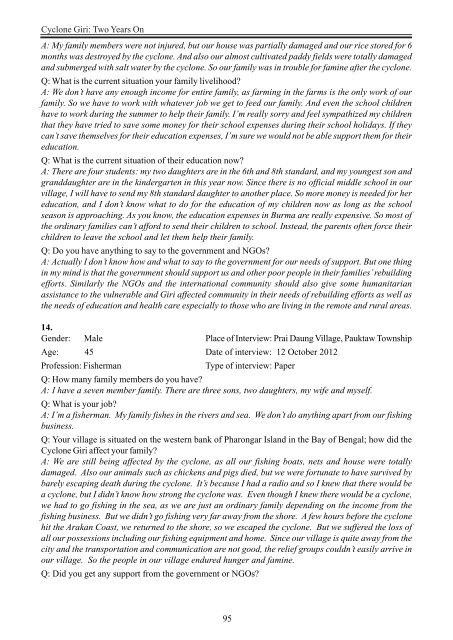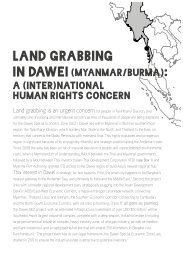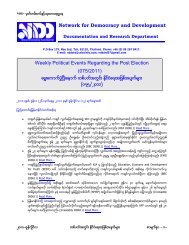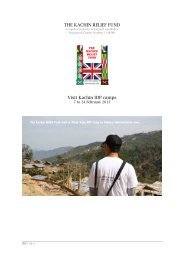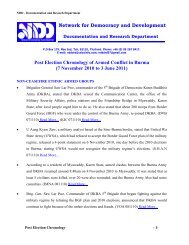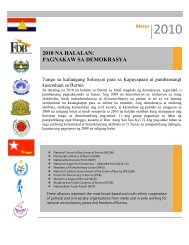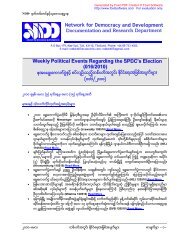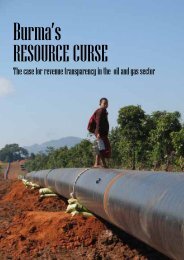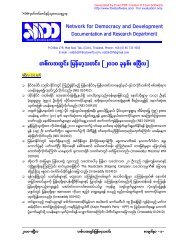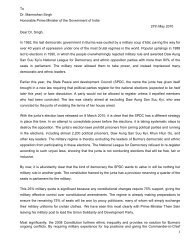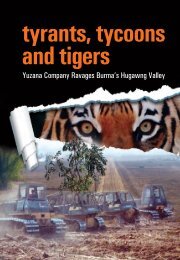Cyclone Giri - Two Years On - Burma Action Ireland
Cyclone Giri - Two Years On - Burma Action Ireland
Cyclone Giri - Two Years On - Burma Action Ireland
You also want an ePaper? Increase the reach of your titles
YUMPU automatically turns print PDFs into web optimized ePapers that Google loves.
<strong>Cyclone</strong> <strong>Giri</strong>: <strong>Two</strong> <strong>Years</strong> <strong>On</strong><br />
A: My family members were not injured, but our house was partially damaged and our rice stored for 6<br />
months was destroyed by the cyclone. And also our almost cultivated paddy fields were totally damaged<br />
and submerged with salt water by the cyclone. So our family was in trouble for famine after the cyclone.<br />
Q: What is the current situation your family livelihood<br />
A: We don’t have any enough income for entire family, as farming in the farms is the only work of our<br />
family. So we have to work with whatever job we get to feed our family. And even the school children<br />
have to work during the summer to help their family. I’m really sorry and feel sympathized my children<br />
that they have tried to save some money for their school expenses during their school holidays. If they<br />
can’t save themselves for their education expenses, I’m sure we would not be able support them for their<br />
education.<br />
Q: What is the current situation of their education now<br />
A: There are four students: my two daughters are in the 6th and 8th standard, and my youngest son and<br />
granddaughter are in the kindergarten in this year now. Since there is no official middle school in our<br />
village, I will have to send my 8th standard daughter to another place. So more money is needed for her<br />
education, and I don’t know what to do for the education of my children now as long as the school<br />
season is approaching. As you know, the education expenses in <strong>Burma</strong> are really expensive. So most of<br />
the ordinary families can’t afford to send their children to school. Instead, the parents often force their<br />
children to leave the school and let them help their family.<br />
Q: Do you have anything to say to the government and NGOs<br />
A: Actually I don’t know how and what to say to the government for our needs of support. But one thing<br />
in my mind is that the government should support us and other poor people in their families’ rebuilding<br />
efforts. Similarly the NGOs and the international community should also give some humanitarian<br />
assistance to the vulnerable and <strong>Giri</strong> affected community in their needs of rebuilding efforts as well as<br />
the needs of education and health care especially to those who are living in the remote and rural areas.<br />
14.<br />
Gender: Male Place of Interview: Prai Daung Village, Pauktaw Township<br />
Age: 45 Date of interview: 12 October 2012<br />
Profession: Fisherman<br />
Type of interview: Paper<br />
Q: How many family members do you have<br />
A: I have a seven member family. There are three sons, two daughters, my wife and myself.<br />
Q: What is your job<br />
A: I’m a fisherman. My family fishes in the rivers and sea. We don’t do anything apart from our fishing<br />
business.<br />
Q: Your village is situated on the western bank of Pharongar Island in the Bay of Bengal; how did the<br />
<strong>Cyclone</strong> <strong>Giri</strong> affect your family<br />
A: We are still being affected by the cyclone, as all our fishing boats, nets and house were totally<br />
damaged. Also our animals such as chickens and pigs died, but we were fortunate to have survived by<br />
barely escaping death during the cyclone. It’s because I had a radio and so I knew that there would be<br />
a cyclone, but I didn’t know how strong the cyclone was. Even though I knew there would be a cyclone,<br />
we had to go fishing in the sea, as we are just an ordinary family depending on the income from the<br />
fishing business. But we didn’t go fishing very far away from the shore. A few hours before the cyclone<br />
hit the Arakan Coast, we returned to the shore, so we escaped the cyclone. But we suffered the loss of<br />
all our possessions including our fishing equipment and home. Since our village is quite away from the<br />
city and the transportation and communication are not good, the relief groups couldn’t easily arrive in<br />
our village. So the people in our village endured hunger and famine.<br />
Q: Did you get any support from the government or NGOs<br />
95


